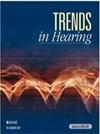Focusing on Positive Listening Experiences Improves Speech Intelligibility in Experienced Hearing Aid Users
IF 3
2区 医学
Q1 AUDIOLOGY & SPEECH-LANGUAGE PATHOLOGY
引用次数: 0
Abstract
Negativity bias is a cognitive bias that results in negative events being perceptually more salient than positive ones. For hearing care, this means that hearing aid benefits can potentially be overshadowed by adverse experiences. Research has shown that sustaining focus on positive experiences has the potential to mitigate negativity bias. The purpose of the current study was to investigate whether a positive focus (PF) intervention can improve speech-in-noise abilities for experienced hearing aid users. Thirty participants were randomly allocated to a control or PF group (N = 2 × 15). Prior to hearing aid fitting, all participants filled out the short form of the Speech, Spatial and Qualities of Hearing scale (SSQ12) based on their own hearing aids. At the first visit, they were fitted with study hearing aids, and speech-in-noise testing was performed. Both groups then wore the study hearing aids for two weeks and sent daily text messages reporting hours of hearing aid use to an experimenter. In addition, the PF group was instructed to focus on positive listening experiences and to also report them in the daily text messages. After the 2-week trial, all participants filled out the SSQ12 questionnaire based on the study hearing aids and completed the speech-in-noise testing again. Speech-in-noise performance and SSQ12 Qualities score were improved for the PF group but not for the control group. This finding indicates that the PF intervention can improve subjective and objective hearing aid benefits.关注积极的聆听体验可提高助听器使用者的言语清晰度
负面偏差是一种认知偏差,它导致负面事件在知觉上比正面事件更突出。对于听力保健来说,这意味着助听器的好处可能会被负面经历所掩盖。研究表明,持续关注积极的经历有可能减轻消极偏差。本研究的目的是调查积极关注(PF)干预是否能提高经验丰富的助听器用户的噪声言语能力。30 名参与者被随机分配到对照组或 PF 组(N = 2 × 15)。在验配助听器之前,所有参与者都根据自己的助听器填写了言语、空间和听力质量量表(SSQ12)的简表。在首次就诊时,为他们验配了研究型助听器,并进行了噪声言语测试。然后,两组人都佩戴研究助听器两周,并每天发送短信向实验人员报告助听器的使用时长。此外,PF 组还被要求关注积极的聆听体验,并在每日短信中报告这些体验。为期两周的试验结束后,所有参与者都根据研究助听器填写了 SSQ12 问卷,并再次完成了噪声言语测试。PF组的噪声中言语表现和SSQ12质量得分均有所提高,而对照组则没有提高。这一结果表明,助听器干预可以提高助听器的主观和客观效益。
本文章由计算机程序翻译,如有差异,请以英文原文为准。
求助全文
约1分钟内获得全文
求助全文
来源期刊

Trends in Hearing
AUDIOLOGY & SPEECH-LANGUAGE PATHOLOGYOTORH-OTORHINOLARYNGOLOGY
CiteScore
4.50
自引率
11.10%
发文量
44
审稿时长
12 weeks
期刊介绍:
Trends in Hearing is an open access journal completely dedicated to publishing original research and reviews focusing on human hearing, hearing loss, hearing aids, auditory implants, and aural rehabilitation. Under its former name, Trends in Amplification, the journal established itself as a forum for concise explorations of all areas of translational hearing research by leaders in the field. Trends in Hearing has now expanded its focus to include original research articles, with the goal of becoming the premier venue for research related to human hearing and hearing loss.
 求助内容:
求助内容: 应助结果提醒方式:
应助结果提醒方式:


